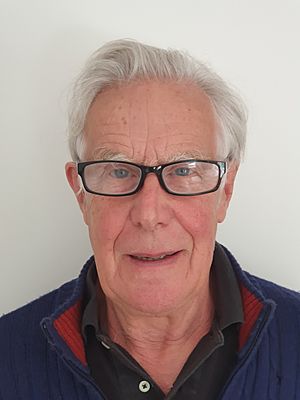Michael J. Morgan facts for kids
Michael John Morgan (born August 25, 1942) is a British professor and scientist who studies how our eyes and brain work together to help us see. He is a professor at City, University of London.
Born in Cardiff, Wales, he has spent his career exploring the science of vision. His work covers everything from the structure of the brain (neuroanatomy) to how we understand what we see (perception). In 2005, he was honored for his important contributions to science by being elected a Fellow of the Royal Society, one of the highest awards a scientist in the United Kingdom can receive. He is married to another famous scientist, biologist Linda Partridge.
Contents
A Scientist's Journey
Education and Early Life
Michael Morgan grew up in Wales and attended Cowbridge Grammar School. His strong interest in science led him to one of the world's most famous universities, the University of Cambridge. He studied at a part of the university called Queens' College. This education set the stage for his future as a leading researcher.
Exploring How We See
Professor Morgan's main area of research is the experimental psychology of vision. This is a field of science that uses experiments to understand how we see the world. Scientists like him study how our eyes detect light and how our brain turns that information into the colorful, three-dimensional world we experience every day.
He also studies psychophysics, which looks at the connection between physical things we can measure (like the brightness of a light) and what a person actually senses and perceives.
Important Books
Professor Morgan has written books that make complex ideas about science and the mind easier to understand.
The Space Between Our Ears
In 2001, he published The Space Between Our Ears. This book was so well-written and interesting that it won the Wellcome Trust Book Prize. The book explores the amazing abilities of the human brain.
Molyneux's Question
He also wrote a book called Molyneux's Question. This book discusses a famous puzzle in science and philosophy. The question asks: if a person who was born blind could suddenly see, would they be able to tell the difference between a cube and a sphere just by looking, without touching them? The book explores how our senses of touch and sight are connected.
External links
- City University Home Page, including download links to Journal Articles
- UCL Institute of Cognitive Neuroscience
- Google Scholar Citations
- Molyneux's Question


